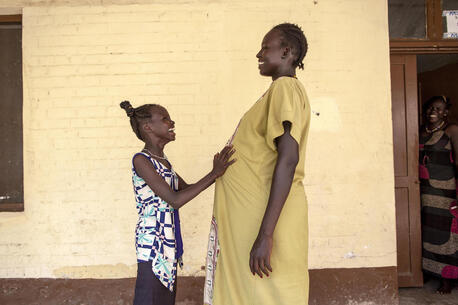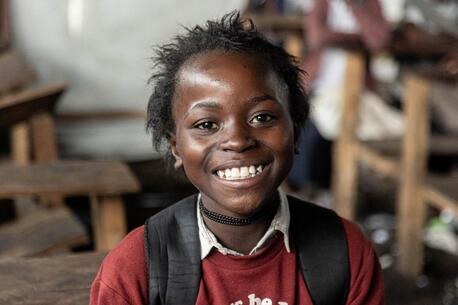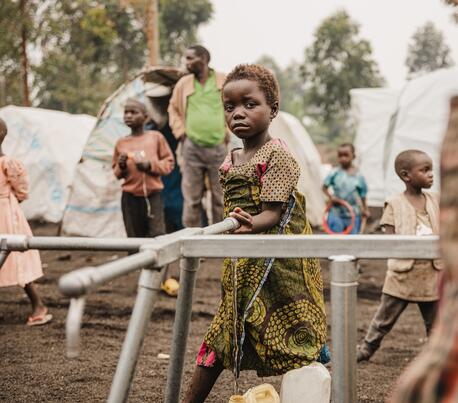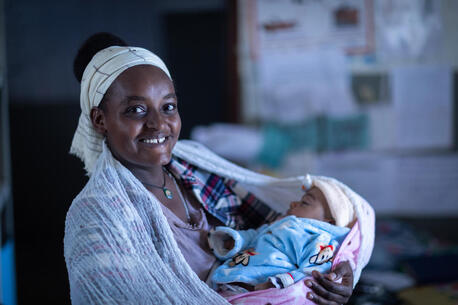
Keeping Babies and Mothers Healthy in Ethiopia, Kenya and Tanzania
UNICEF and The Church of Jesus Christ of Latter-day Saints are collaborating to improve outcomes for newborns and their moms through a sustainable, scalable in-service training program for health care workers.
The first 28 days are the most vulnerable time in a child's life
Newborn mortality rates in Eastern and Southern Africa are among the world's highest. The primary cause? Low-quality health care. To give babies the best possible start in life and to protect the health of their mothers, UNICEF teamed up with The Church of Jesus Christ of Latter-day Saints to expand support for UNICEF's Learning Hubs approach leading to the Center of Excellence model for training and mentoring health workers.
The sustainable, scalable initiative launched in Ethiopia, Kenya and Tanzania in 2022, establishing learning hubs and localized simulation centers and organizing mentorship programs to equip health care providers with the skills and knowledge they need to improve standards of care and reduce maternal and neonatal mortality rates.
"The Church has supported other types of programming implemented by UNICEF and local UNICEF offices had collaborated with the Church on its maternal and newborn care training program in several countries, but this project was the first collaboration in the Africa Central area to address key drivers of maternal and newborn mortality," said Phillip Moatlhodi, Welfare and Self-Reliance Manager for the Church’s Africa Central Area. “The ability of mothers and newborns to receive quality care increases their opportunity for a healthy start.”
Learning Hubs provide health workers with a laboratory for ongoing in-service training
Student doctors, nurses and midwives begin their education at school or medical college, but their training doesn't stop there. To coach, mentor and train health workers in the field, the Center of Excellence program is driven by a network of Learning Hubs.
The Learning Hub approach moves away from traditional classroom instruction to routine hospital-based hands-on training including post-training follow-up, mentoring and supportive supervision. This effort emphasizes the need to secure strong buy-in from national governments, identifying strategies to take the training hubs and mentorship approach to scale. Training hubs will support countries to achieve the following by building health care providers’ skills and competencies for improved quality care and referrals as required at each level of the referral system.
“Practicing on mannequins can develop competency and a degree of confidence, but it takes practicing on real clients to achieve proficiency," says Fatima Gohar, Maternal, Newborn and Adolescent Health Specialist at UNICEF Eastern and Southern Africa Regional Office. “With this innovative program, we are ensuring that participants gain not only competency but also proficiency in lifesaving skills. After gaining competency on mannequins, participants will apply their newly learned skills on real clients, under the careful supervision of clinical preceptors.”
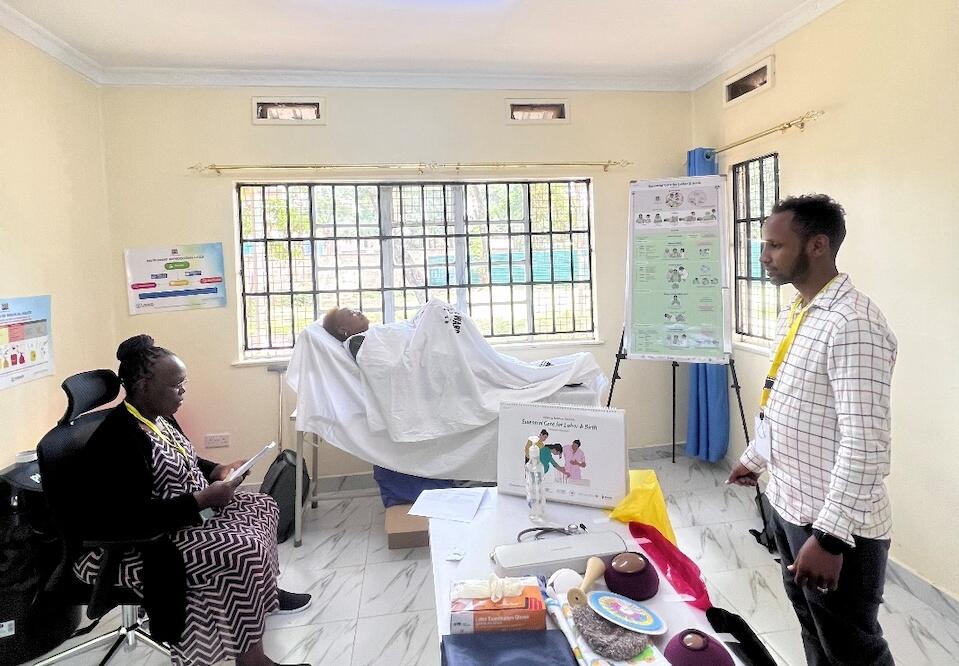
Personalized support for women in labor improves outcomes
A chronic shortage of skilled health workers and inadequate human resource management across the region often leaves women to labor alone without the support they need, increasing the risk of maternal and neonatal death. “In our trainings, we are able to leverage the resources we have from the Church," said Gohar. "Merging the resources of the Church and other partners, we have been able to reach the first milestone of this partnership where we are starting to see changes, at least in the hospitals we are working in now."
One of those changes is the implementation of essential care during labor and birth by introducing dynamic birthing positions and non-pharmacological pain relief measures including the use of birthing balls to support women in labor.
"There were two women that we observed, and the participants were supporting them with back massages and everything. And the women really didn't want get off of that birthing ball," Gohar said. "After they delivered, one of the women said she loved sitting on that ball. It's that positive experience of birth, you know, where you're not just on your bed alone, taking labor pain, you have no one to offer you water, or ask about the intensity, or give some emotional support. And here you have a midwife or a doctor somewhere who's really taking care of you. Because on the birthing ball, you need to have someone with you. A woman could not be there alone. It’s getting that personalized support.”
"The knowledge acquired on the benefits of alternative birthing positions and pain relief therapies during birth is the starting point to greater outcomes and memorable experiences,” said Christina Ogolla, an experienced midwife at Pumwani Maternity Hospital in Nairobi, Kenya, who participated in the training.
A positive birth experience can help a new mother become a better caregiver to her newborn
"I remember once I was training on newborn care, and I asked, 'What is the best position for a childbirth?' And then someone asked me, 'For whom? Is it for a provider or for a mother?'" Gohar recalled. "Allowing mothers to use alternate birthing positions helps enhance their positive experience, which will help them not only to come back, but also in the proper care of their child."
"Because perinatal mental health is a neglected area. A lot of women go through depression or other mental health issues. I recently read about the influence of negative birth experiences on the mental health of mothers. Through this program, we are really trying to improve positive experiences during birth which then may have an impact on their mental health. Of course, if the mum's mental health is good, there will also be a positive impact on early childhood development from the aspect of caregiving."
An ever-widening pool of service providers equipped to handle emergency obstetrics and newborn complications
One of the key program learnings is that local ownership is needed for the scale-up of any successful program. By involving leadership stakeholders from national and sub-national levels, along with other key stakeholders to discuss learning hubs as a team, UNICEF was able to gain the buy-in for this innovative programmatic approach.
The training approach is designed to cascade down from mentors to other health workers in the same catchment area who will then, in turn, train their colleagues, creating an ever-growing pool of maternal and newborn service providers who are equipped with skills in emergency obstetrics and newborn complications during pregnancy, birth and the immediate postpartum period.
Early results are positive. In Ethiopia, for example, about 15,000 childbearing mothers in antenatal, delivery and postnatal services, 11,000 newborns and 31,500 children have benefitted from interventions related to the learning hub at the Nigist Eleni Mohammed Memorial Comprehensive Specialized Hospital.
Every child deserves a healthy start in life
The program has received the support and buy-in of Governments, along with support from Laerdal Global Health (technical and in-kind), and other partners and UN agencies to help ensure program sustainability. UNICEF is currently looking to further its reach as it moves into a second year of implementation. In 2024, the project will be implemented in more health centers in Ethiopia and Kenya, and expand to Angola, Lesotho and Mozambique. By increasing in-service training for health personnel, providing better care in catchment-area health centers and decongesting referral maternity hospitals, more mothers and their newborn children are receiving the high-quality health care they need. "We are all children of God and we believe each child of God should have the opportunity for a healthy start in life," said Moatlhodi.
Thanks to partnership and seed funding from The Church of Jesus Christ of Latter-day Saints, UNICEF is establishing critical centers of excellence, building long-lasting health care infrastructure systems and making the case to other countries for similar improvements to their health systems.
Learn more about UNICEF's partnership with the Church of Jesus Christ of Latter-day Saints.
UNICEF does not endorse any company, brand, product or service.
